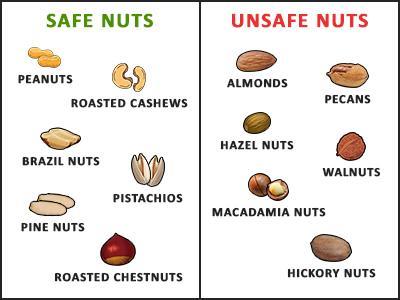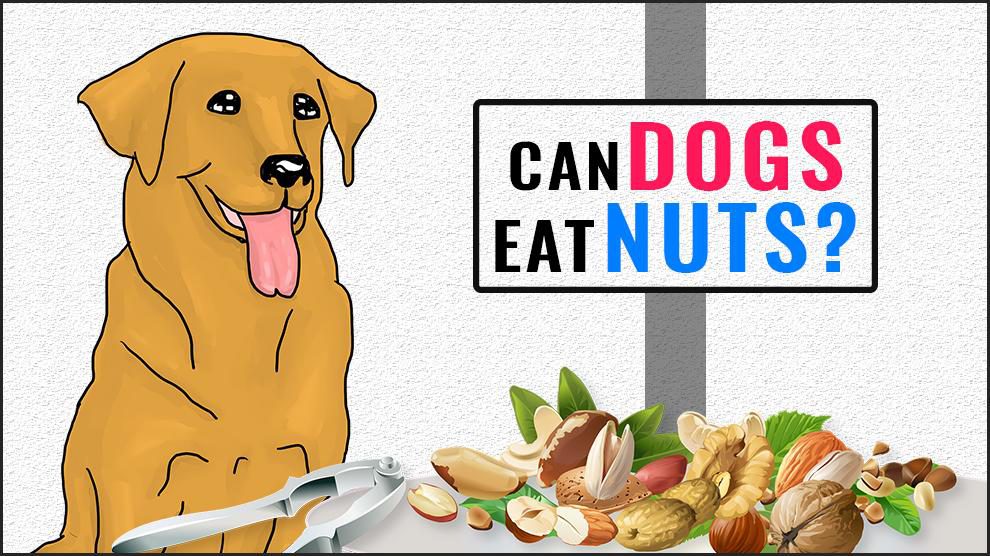Dog Pregnancy Calculator And Timeline
Yes, dogs can eat some nuts. But, most nuts remain a bad choice for dogs, and some are very toxic. Humans, in fact, love eating nuts. Nuts consist of proteins and other healthy fats. However, nuts are considered to contain too dense fats and hence should not be a part of the dog’s regular diet.
Can you give nuts to your dogs? Let’s check what nuts are really safe for your dogs.
Are Nuts Bad For Dogs?
Some nuts are really toxic to dogs. Since most of them are rich in fat, they can cause pancreatic problems. Moreover, feeding your pets with salted nuts can increase other complications and also lead to water retention.
You should still be watchful that even nuts declared healthy can still cause a health risk.

Generally speaking, dogs with sensitive conditions like pancreatitis should avoid nuts because they are most likely to experience diarrhea or vomiting.
Also, large nuts like walnuts and pecans are due to their large size can cause intestinal upset. In addition, dog owners should avoid feeding moldy nuts and avoid nuts lying outside too long because they can cause seizures in some cases.
Can Dogs Eat Seeds?
Some fruit seeds like cantaloupe, honeydew, and watermelon seeds are harmless. However, fruit pits are not considered safe and it’s better to avoid apricot, plum, nectarine, peach, and cherry pits.
Note: Don’t feed seeds with shells as dogs cannot digest shells and may get digestive complications.
Can dogs eat sunflower seed?
Dog lovers can feed sunflower seeds to their pets after removing the shell. You may provide unsalted and unshelled sunflower seeds occasionally, as the vitamins and minerals keep your dogs healthy. The fatty acids present help have a healthy coat and skin. But keep in mind, that your dog can get the required nutrition from other dog foods and sunflowers may be given as an occasional treat only.
Are Nuts Good For Dogs?
It’s better to give nuts as treats as they contain proteins and Omega-3 fats which many dogs actually lack.
Overall, your dog totally depends on you and as a responsible dog owner, you should contact your vet before making any suitable diet changes.
Nuts For Dogs To Eat
Nuts that are safe for dogs include cashews, hazelnuts, and peanuts. But, be more watchful as nuts contain high levels of fat and can cause diarrhea and vomiting in dogs.
Are Peanuts Good For Dogs?
Quite safe for dogs only if you feed in very small quantities. However, too much will result in allergies and pancreatitis. Unsalted and dry roasted peanuts are safe for dogs. Dogs cannot eat peanut shells. Peanuts, in general, are a great reward for dogs but keep it to a minimum.
Are Cashews Bad For Dogs?
You can give roasted or baked cashews to dogs since high-temperature preparation eliminates the toxin in them. However, high potassium levels in cashews have an impact on the function of kidneys and result in urinary crises in the long run.
Can Dogs Eat Hazelnuts?
Hazelnuts are not toxic to dogs and won’t create problems if your dog eats one or two unsalted, plain hazelnuts occasionally. But, hazelnuts are prone to create choking hazards in dogs, especially small ones. If the size is small and right, it won’t be a problem. The fact is most packed nuts have an elevated amount of sodium, and too much salt is toxic to dogs.
Bad Nuts For Dogs
Can Dogs Eat Hickory nuts?
The toxin juglone present in this nut causes laminitis. Therefore, consuming these nuts can cause an intestinal block or gastric intestinal upset.
Are Pistachios Good For Dogs?
Pistachios are harmful to dogs. These green nuts, as human favorites are beneficial to dogs but are not good for canines. Aspergillus mold present in pistachios produces aflatoxin that can cause liver failure in dogs when consumed.
Moreover, unshelled pistachios definitely are a choking hazard and block your dog’s intestine.
Even more, regular consumption of Pistachios can lead to pancreatitis and weight gain too.
Are Pine nuts Bad For Dogs?
Since they are high in phosphorus and fat, pine nuts cause stomach upset and are bad for dogs. If your dog consumes large quantities of pine nuts, they are susceptible to urinary tract infections.
You also need to watch out for the toxicity symptoms like vomiting, sluggish activities, and no hunger. Dogs cannot have pine nut oil either as it may affect the tissues in the respiratory passages.
Are Walnuts Good For Dogs?
Walnuts are not safe for dogs. Walnuts contain a poisonous toxin produced by molds and fungi called tremorgenic mycotoxins that causes tremors or seizures. Also, they contain more fat which is not recommended for dogs. a poisonous toxin called tremorgenic mycotoxins.
Black walnuts contain juglone, a toxic substance that may cause seizures and other dangerous neurological complications.
English walnuts may be considered a bit safer than black walnut as the level of juglone in them is lesser compared to black ones. However, both are not recommended for dogs.
Can Dogs Eat Macadamia nuts?
Macadamia nuts are poisonous to dogs and never offer even a small portion of the nut for a treat to your dogs. According to ASPCA Animal Poison Center, even one nut can potentially harm your dog. If you suspect that your dog has eaten macadamia nuts, watch out for symptoms like vomiting, diarrhea, weakness in the legs, tremors, abdominal pain, and fever. Contact your vet immediately.
Are Almonds Good For Dogs?
Almonds are not advisable for dogs. Even though dogs love the taste of almonds, they are not easily digestible and can create stomach upset.
Giving Nuts To Dogs
If you are keen to feed nuts to your dog, keep in mind these simple rules-
Never ever offer whole nuts
- Chopping nuts will stop choking and gut obstruction. Moreover, it’s very safe to give these foods with butter.
- In general, dogs love this more and unseasoned peanut butter remains the popular ingredient in various dog treats.
Avoid seasoning at any cost
Syrup, spices, and salt are toxic for dogs. Therefore, you should not season any pet nuts and food as they can do more harm.
My Dog Ate Nuts What Should I Do?
Some of the most common symptoms to watch out for if your dog eats nuts include
- Black walnuts – These types of walnuts consist of a poison called juglone and are known to cause gastric obstruction. Furthermore, moldy walnuts consist of tremorgenic mycotoxins that can cause neurological or seizure issues in dogs.
- Almonds – Dogs love almonds and in general the flavored variety including cinnamon, vanilla, smoked, barbecued, or jalapeno. While not poisonous, they can create gastric or stomach upset.
- Macadamia nuts – Being rich in fat, they are known to cause pancreatitis or stomach upset. Also, the presence of toxic material can result in neurological problems. In certain cases, they can cause serious health issues like bladder stones and hindquarters paralysis.
- Pistachio nuts – These nuts are also quite strong in fat and eating them continuously can lead to pancreatitis.
- Pecans – Moldy pecans are known to create stomach troubles.
- Hickory Nuts – These nuts are also known to create unnecessary gastric problems. So, avoid feeding it to your dog.
- Japanese Walnuts and English Walnuts – Like Japanese or black walnuts, these English Walnuts can lead to neurological or seizure problems.
Final Words
While all nuts are not toxic, there are other treats that are way healthier than nuts. So, avoid feeding your dog with nuts.


















